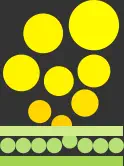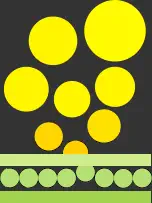Giftedness has been a subject of quite some institutional research for a while. IQ tests
confer intelligence a certain measurability (although perhaps not a measurable
certainty). These tests are regularly recalibrated so that a person with results at least
four standard deviations from average (presuming a Gaussian distribution of
intelligence) will score at 130 or above.
But the matter is losing its mathematical (or rather probabilistic) clarity. There is a
growing sense that a written, standardised test cannot really seize the manifold
diversity of intelligences and giftedness. For instance, how could it measure a
giftedness in fine arts or crafts, all the more by merely ticking multiple choice answers?
How could a single figure reflect creations being born without any words or numbers
but instead out of matter from gifted hands? How could a figure measure excellence in
these text- and numberless talents?
With the concept of intelligence losing its sharpness, so does giftedness. Somewhere
on the spectrum of growing intelligence, there seems to be a point where the simple
"more" turns into "different". This otherness may make things difficult when it comes to
finding the right vibe or tone for interacting with others without standing out in a fashion
that may cause others to feel uneasy or to start sending subtle and less subtle warning
signals or even turning people away, because they experience these interactions as
destabilising or even transgressive.
Some people suggest that intellectually gifted people also are highly sensitive persons
(HSP) much more often than on average. There currently seems to be no strong
evidence to support this. It rather may be that for outside observers, somebody
observing the world with a sharp mind and a sense for details might seem to be highly
sensitive, when it is an intellectual rather than an emotional skill. But who knows?
In the end, there can be an irreducible otherness that can impede opening up to others,
especially with somebody who already has a record of experiencing this otherness to
be the reason for rejection by others. After all, in this time, the world seems rather more
than less prone to judge without further consideration, isn't it?
Sometimes, a gifted person will unconsciously entangle herself or himself into an
apparently consistent system of thought and cannot find the way out any more.
Perhaps sometimes somebody from outside can lend a friendly, helping hand.
Take a jump into that open-minded space of exchange with me, devoid of stereotyped
judgments.
See also:
•
Your first coaching session - how does it go?
•
Systemic coaching methods & inspirations
•
Blog & Articles
Phone +49 160 9623 2547

Alexander Hohmann
Life Coach & Business Coach in Freiburg (Germany) & Online
E-Mail:
Alexander Hohmann
Life & Business Coach in
Freiburg or Online
Certified Systemic Coach
(English / German / French)

Giftedness has been a subject of quite some
institutional research for a while. IQ tests
confer intelligence a certain measurability
(although perhaps not a measurable
certainty). These tests are regularly
recalibrated so that a person with results at
least four standard deviations from average
(presuming a Gaussian distribution of
intelligence) will score at 130 or above.
But the matter is losing its mathematical (or
rather probabilistic) clarity. There is a growing
sense that a written, standardised test cannot
really seize the manifold diversity of
intelligences and giftedness. For instance,
how could it measure a giftedness in fine arts
or crafts, all the more by merely ticking
multiple choice answers? How could a single
figure reflect creations being born without any
words or numbers but instead out of matter
from gifted hands? How could a figure
measure excellence in these text- and
numberless talents?
With the concept of intelligence losing its
sharpness, so does giftedness. Somewhere
on the spectrum of growing intelligence, there
seems to be a point where the simple "more"
turns into "different". This otherness may
make things difficult when it comes to finding
the right vibe or tone for interacting with
others without standing out in a fashion that
may cause others to feel uneasy or to start
sending subtle and less subtle warning
signals or even turning people away, because
they experience these interactions as
destabilising or even transgressive.
Some people suggest that intellectually gifted
people also are highly sensitive persons
(HSP) much more often than on average.
There currently seems to be no strong
evidence to support this. It rather may be that
for outside observers, somebody observing
the world with a sharp mind and a sense for
details might seem to be highly sensitive,
when it is an intellectual rather than an
emotional skill. But who knows?
In the end, there can be an irreducible
otherness that can impede opening up to
others, especially with somebody who already
has a record of experiencing this otherness to
be the reason for rejection by others. After all,
in this time, the world seems rather more than
less prone to judge without further
consideration, isn't it?
Sometimes, a gifted person will unconsciously
entangle herself or himself into an apparently
consistent system of thought and cannot find
the way out any more. Perhaps sometimes
somebody from outside can lend a friendly,
helping hand.
Take a jump into that open-minded space of
exchange with me, devoid of stereotyped
judgments.
See also:
•
Your first coaching session - how does
it go?
•
Systemic coaching methods &
inspirations
•
Blog & Articles
Coaching for Gifted People




















